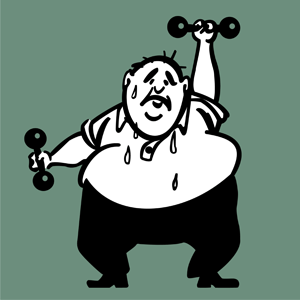
Some researchers argue fatness does not affect health as long as you are fit, which means your heart and lungs are strong. And national campaigns like Let’s Move are focused on exercise for health without a specific focus on weight loss.
But for people who are obese, losing weight might be more important to their overall health than focusing on fitness. In fact, evidence shows that exercise alone is not an effective way to lose weight. Rather, effective weight loss is mostly about what you eat, though it should also include exercise.
Read: 5 ways to get the most out of a treadmill workout
As family physicians, we see obese patients who have heard the message to “just be fit” and have added 10-15 minutes of walking to their daily routine or have bought a Fitbit to track their physical activity. We applaud these efforts.
But for many obese people, the message that physical activity is more important than managing weight is not only unhelpful but also not true. When it comes to health and wellness, fatness can matter more than fitness.
And of course, for most people, fatness is related to fitness, because excess weight can make exercise much harder.
How are fitness and fatness are linked?
Multiple studies have looked at fitness and obesity as two separate entities because they are seemingly separate concepts: one measures how well your heart and lungs work to supply oxygen to your muscles while the other is a measure of your body height and weight.
However, the measures of fitness and fatness are both influenced by how much you weigh. Because of the way fitness is calculated, for two people with the same oxygen-transferring power, weighing more typically means lower fitness.
Likewise, what researchers mean by fatness is really body mass index (BMI), a measure of body fat based on height and weight. People are often surprised at what is considered normal weight.
Read: The beginner's guide to a spinning class
Strictly speaking, obesity does not mean you are automatically unfit. There are obese people who run every day, and then there are thin people who couldn’t run a mile for their life.
A muscular individual can also be considered obese, because muscle weighs more than fat, and be very fit.
But these are exceptions, not the rule. Studies show that when someone is categorised as obese, the likelihood of them being fit is very low. So in our society, being obese still generally means lower fitness.
Fatness makes it harder to improve fitness
For people who are obese, focusing on losing weight is a better place to start than just focusing on fitness. That’s because extra weight can make it harder to move, and thus harder to exercise.
Obese individuals often have a difficult time doing physical activity due to body size, limited mobility and joint pain.
Physiologically, it is more difficult for an obese individual to do the same amount of exercise as a healthy-weight person because of the extra weight they carry. Heavier people need more oxygen to do the same exercise as a healthy-weight person.
Some obese people report that even walking can seem tough. Fitness is just harder to achieve if you can’t move easily.
Fatness decreases your quality of life
The debate around fitness and fatness centers on studies that show that compared to normal weight-fit individuals, unfit individuals had twice the risk of mortality regardless of BMI. But as these studies show, a relatively small proportion of people are fit and obese.
But mortality is not the only issue. Obesity has been shown to predict diabetes, heart disease, liver disease and a whole host of health problems that may require taking daily pills or having daily injections, or lead to invasive procedures.
Even if a higher BMI does not predict earlier death, this does not mean that it “doesn’t matter” to your health.
Read: How exercise can help you manage your diabetes
While exercise can and does improve health, for people who have health conditions like diabetes or fatty liver disease, exercise alone won’t make a huge difference in reversing these conditions. However, these conditions can be improved or even resolved with weight loss (decreasing body fat).
Fatness also has a lot of other implications outside of strictly health effects. For family physicians like us that care for obese patients, the most heartbreaking stories are from obese patients who can’t go on roller coasters with their children or can’t keep themselves clean due to their size.
Increasing physical activity without losing weight will not likely improve these patients’ lives. To improve their health and quality of life, it is important to exercise every day, eat healthy food and, most importantly, lose some weight.
Read more:
Avoid jiggling belly fat when you exercise
Exercises that bring out the best in your body shape
We need to exercise more AND spend less time sitting
Image: Man with dumbbells from iStock![]()
Tammy Chang, Assistant Professor, Family Medicine, University of Michigan and Caroline R Richardson, Associate Professor of Family Medicine , University of Michigan
This article was originally published on The Conversation. Read the original article.




 Publications
Publications
 Partners
Partners














